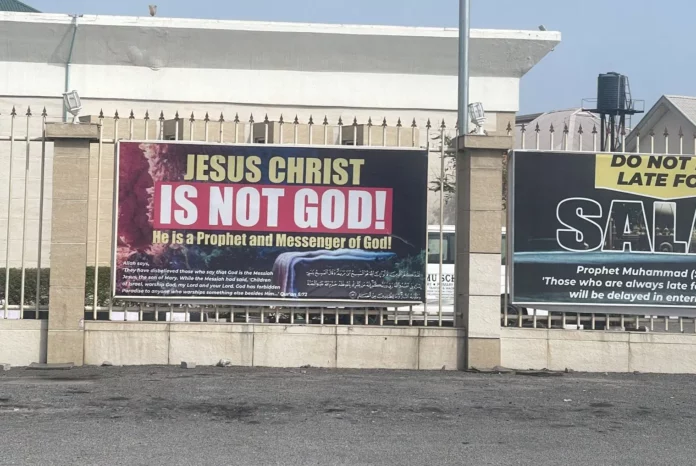A banner outside the Lekki Central Mosque in Lagos declaring “Jesus Christ is Not God” sparked a heated debate after its image circulated on social media.
The banner, prominently placed on the mosque’s fence, attracted criticism from various quarters, with many seeing it as an affront to the Christian faith.
However, the Chief Imam of the mosque, Ridwanullah Jamiu, has clarified that the message was not meant to offend but to educate Muslims about their faith.
Speaking to his congregation, Imam Jamiu explained that the mosque often displays banners featuring teachings from the Quran and Hadith.
“When you come to Lekki Central Mosque, at least you should learn something,” he said.
He added, “You pass by the banners outside, you look here and there, you learn something because Islam treasures knowledge.”
According to the Imam, the banner was one of many aimed at educating worshippers and the public about Islamic teachings.
The controversy escalated when calls started pouring in from government officials and local authorities.
Jamiu revealed, “I received calls from the government, local government, and area command appealing to us to please remove the banners because of the festive period.”
While the Imam maintained that the banner had been up for two months without issue, he agreed to its removal to prevent further tension.
“It is not cowardice,” he said, addressing critics who accused the mosque of succumbing to pressure. “We removed it to let peace reign, to obey our government because we are peace-loving people.”
The Imam emphasised that Muslims revere Jesus Christ, referred to as Isah in the Quran, but they do not see him as divine.
“If you don’t believe in Jesus, you are not a Muslim,” Jamiu stated firmly.
He continued, “We are Muslims, and anything we believe must be in consonance with the Quran. The Quran says Jesus Christ is not God; he’s a messenger of God. We quoted this verse in the banner.”
Jamiu defended the mosque’s right to display the banner, citing religious freedom.
“This is freedom of religion, freedom of speech,” he said.
The timing of the controversy, coinciding with the festive season, led some to believe the banner was intended to provoke Christians celebrating Christmas.
Jamiu dismissed such claims, stressing that the display was purely educational and had no malicious intent.
“There’s a difference between the propagation of Islam and provocation,” he noted.
The Imam reiterated that the mosque is committed to peace and dialogue, not conflict.
Despite removing the banner, Jamiu assured the congregation that it would return in a modified form.
“We are going to modify it and put it back,” he declared.
The new banner now reads: “Allah is the Lord of Jesus,” reflecting the same theological stance in a less contentious tone.
The incident has reignited conversations about interfaith relations in Nigeria, a country with significant Muslim and Christian populations.
Some social media users expressed outrage over the banner, accusing the mosque of disrespecting Christianity. Others defended the mosque, arguing that religious freedom allows such expressions.
One worshipper at the mosque said, “People are reading too much into this. It’s just a verse from the Quran that reflects Islamic beliefs.”
A Christian respondent, however, said, “It’s insensitive, especially during Christmas. They should have known better.”
Jamiu used the opportunity to call for greater understanding between faiths.
“Nobody can monopolise Jesus,” he said. “We all have what we believe about him. Let us respect each other’s perspectives.”
The Imam concluded by urging his followers to remain calm and respectful in the face of criticism.
“We are peace-loving people,” he said. “Our goal is to educate, not to provoke.”
Nigeria’s religious landscape is deeply divided, with nearly equal numbers of Christians and Muslims. This demographic balance often makes interfaith issues particularly sensitive.
In recent years, both communities have faced challenges related to perceived provocations and misunderstandings, highlighting the need for mutual respect and dialogue.
The Lekki mosque incident underscores how public expressions of faith can easily become flashpoints in a multi-religious society.
As the festive season continues, religious leaders across the country are calling for peace and tolerance to ensure harmony among all Nigerians.

